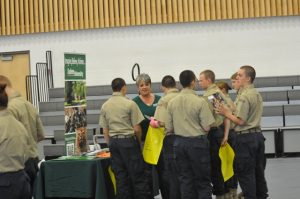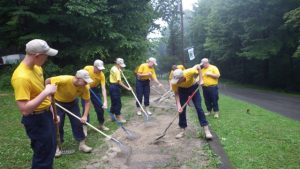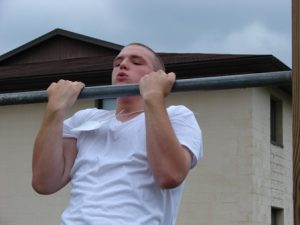Core Components
There are eight core components of the Mountaineer ChalleNGe Academy program. Cadets must successfully complete all eight components to graduate from the Academy. The core components are designed to educate and produce youth that will become productive members of the community upon graduation.
1. Academic Excellence
Classroom studies at the Academy are designed to enhance the Cadet's educational skills and instill a desire to continue self-improvement throughout their lifetime. Studies include the five basic areas included on the High School Equivalency certificate test: math, science, social studies, language arts and literature. PLATO is the software program which is used to enhance basic skills in addition to allowing for personal advancement. The Academy also uses the TABE (The Adult Basic Education) test which is a measure of performance which correlates to traditional secondary school grade levels. Approximately 17 weeks into the program, Cadets take the high school equivalency examination and the Workplace Readiness examination. High School Diplomas are issued to Cadets who qualify as part of the Option 1 Pathway by successful completion of these two examinations as well as completing the MCA 22-week course work.

2. Life Coping Skills
Cadets explore their value structure and come to understand the attitudes, needs, and desires that serve to motivate them as individuals, as members of the Academy and as citizens. Goal Planning is an on-going part of ChalleNGe. Each Cadet develops a Life Plan which includes short-term and long-term goals. Included in this area are classes and workshops on Healthy Relationships, Gender Stereotyping, Team Building, Parenting and Personal Finance.

4. Health and Hygiene
It is important that each Cadet understand the positive correlation between good health and hygiene habits and life-long mental, physical and emotional well-being. Tobacco Prevention Education Classes, Nutrition, and Sexual Responsibility are just a few of the topics covered.
5. Responsible Citizenship
Each Cadet will develop a better understanding of the forces that work to make a community strong and supportive of its members, as well as the forces that work to disintegrate a community. Cultural Diversity and Awareness, Violence Prevention, Promoting Justice, Voter Registration, Selective Service and the Honor Code/General Orders are among some of the topics discussed.

6. Service to the Community
In the Core Component of Service to the Community, Cadets develop an understanding of the benefits gained through volunteering in community projects and agencies. Cadets volunteer many hours during each 22 week program performing services for organizations such as Trout for Cheat, Local Food Banks, Local Fire Departments and the American Red Cross. Certificates and awards are given to Cadets for their participation.
7. Leadership / Followership
Each Cadet gains exposure to the traits of a good leader and the skills necessary to become a good team member. These skills prepare the Cadet to serve in such roles of leading and following as: Color Guard, Drill and Ceremony, Land Navigation, Platoon Olympics,and Hard Core Challenges.




